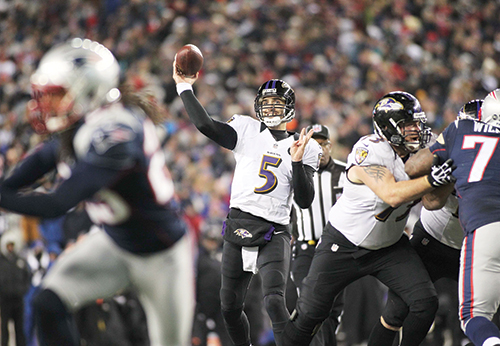Joe Flacco is less than a week away from leading his Baltimore Ravens into the Super Bowl. He has made the playoffs in each of his first five years in the league and has the most wins of any NFL quarterback since 2008.
Flacco makes his mark with Ravens

Joe Flacco is less than a week away from leading his Baltimore Ravens into the Super Bowl. He has made the playoffs in each of his first five years in the league and has the most wins of any NFL quarterback since 2008. He has played the most important position for a consistently competitive franchise, a team that has championship pedigree and championship expectations. His supporting cast has ranged in caliber from second-rate to workmanlike, and Ray Rice, Baltimore’s running back and best weapon, is criminally underused in their offense. In spite of all that, Flacco has kept the ship afloat. And he’s kept winning.
This probably sounds like a rousing endorsement for Joe Flacco. It probably seems as if I am about to spring to the defense of a player that, in spite of his team’s success, has never thrown for more than 4,000 yards in a season or more than 25 touchdowns and is now awaiting a contract extension from the Ravens because, in spite of what they will say publicly, they were not entirely sure he was worth the money.
But I’m not going to spring to his defense. And I’m not going to tell you how wildly overrated he is, either. I’m not going to participate in the ridiculous myth-making of professional sports one way or another. Look at Flacco’s stats, watch him play and decide for yourself what you think. His successes haven’t been awe-inspiring, his failures haven’t been embarrassing. There isn’t a myth to make. In terms of how the starting quarterback story normally goes, there’s barely a story to tell.
Flacco is perhaps the perfect example of the limitations and frustrations of the public discourse on sports. As the story, he’s a lousy one, but as a part of a more complex discussion, he’s a fascinating piece. A glance at some of Flacco’s career numbers, for example, reveals that, statistically, he’s in the same ballpark as Troy Aikman and John Elway.
Aikman never had a 4,000-yard season or threw for more than 23 touchdowns, while Elway only topped 4,000 yards once. Flacco also shares their postseason success, their stout offensive lines, their potent running games and their intelligently managed franchises.
Again, you might be tempted to interpret that last paragraph as a plea to include Flacco in the same breath as those two legends. You have been conditioned to jump on that storyline, to begin comment threads about how stupid it would be to compare them or how I kind of have a point. But that’s not my point at all. I wasn’t even trying to compare the sum of their careers, I was merely suggesting that there is more to success than numbers, quarterbacks, eras or coaches. That there is more to our heroes than the myths we invent. That maybe greatness is defined by being the right man for the job, whether you get the credit and the Hall of Fame jacket or whether you’re Joe Flacco.
The total creative bankruptcy of the sports entertainment complex relies on the idea that we fans are too stupid to consider these kinds of things, that Stephen A. Smith and Skip Bayless screaming thoughtless drivel is all the subtlety we can possibly appreciate or are patient enough to endure. But the Super Bowl, more than any other event, casts the larger scope of sports culture into stark relief. It’s a game that ostensibly ought to engage a pair of fan bases, but instead attracts the world. It is a reminder that there is something deeply fascinating about sports that can’t be neatly summed up, something that perhaps Herm Edwards is ill-equipped to explore in three “Coors Light Cold Hard Facts.” Something that thoughtful sports writers and journalists are beginning to explore through less mainstream media, and something we are smart enough to seek out and demand.
In other words, something that Joe Flacco isn’t. He isn’t a hero, a goat, an enigma or even a story. He’s a piece of something better than that—no matter what this week’s “narrative” has to say.





